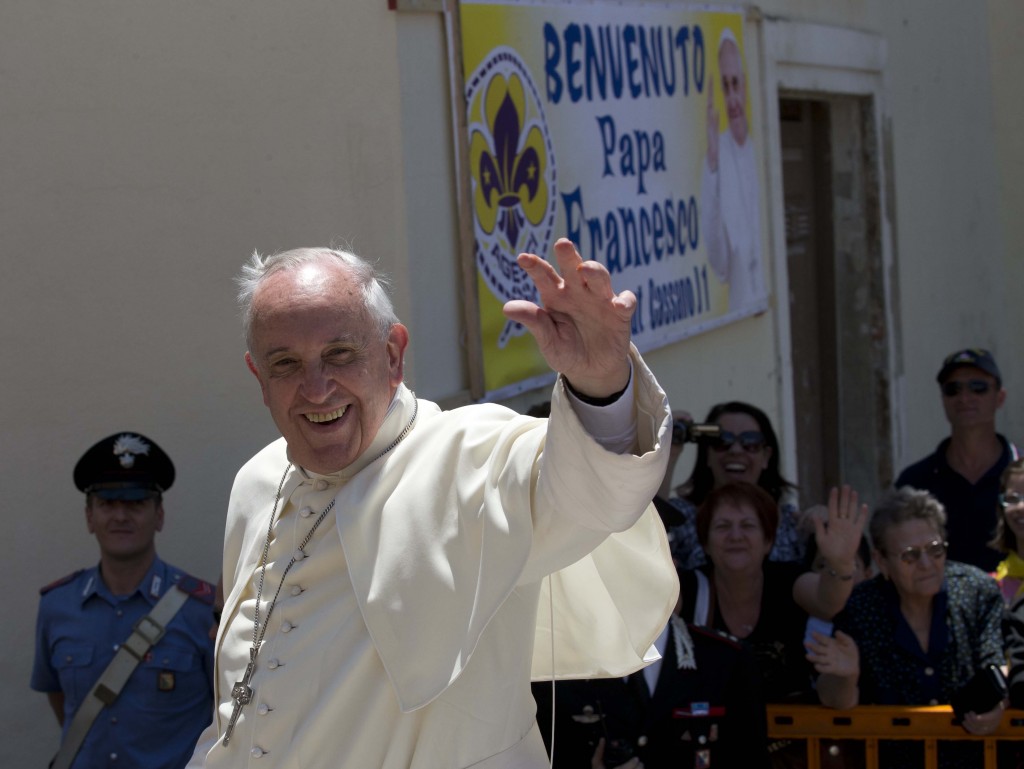
In June Pope Francis travelled to Calabria in the toe of the boot of Italy. Calabria is home to the powerful ‘Ndrangheta Mafia (see blog posts: “The Catholic Church and the Mafia” and “Mafia Claws Sinking into Weak Flesh“). There, speaking to hundreds of thousands of people, the Pope said, “The ‘Ndrangheta and this adoration of evil, and disrespect for the common good, this evil should be fought, should be pushed away, we must say NO….those who in their lives have taken this path of evil, as the mobsters have, they are not in communion with God, they are excommunicated.”
No Pope has ever said something that strong before against the Mafia. The only one who got close was Pope John Paul II. In 1993, Pope John Paul II delivered an impassioned call for members of the Mafia to convert on a visit to Agrigento, Sicily. From the pulpit he intoned: “I say this to those responsible- Convert!! One day the judgment of God will arrive.”
The ‘Ndrangheta is now considered Italy’s most power Mafia organization, outpacing the Sicilian Cosa Nostra and the Naples area Camorra syndicates. The ‘Ndrangheta is involved in worldwide drug-trafficking, money-laundering and extortion. But despite its global reach, the group sticks to its Calabrian roots and rituals that are closely linked to Catholic traditions. It didn’t take long for there to be a reaction to Pope Francis’ excommunication comment.
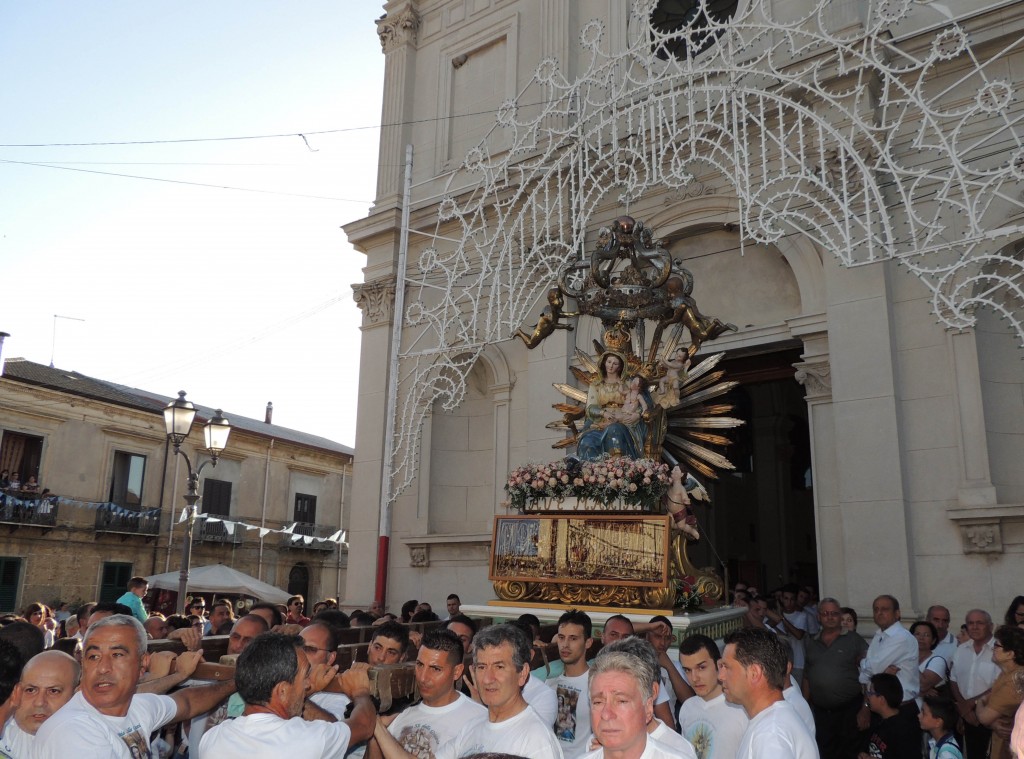
On July 2nd, in the small town of Oppido Mamertina in Calabria, hundreds of residents took part in the procession of the Holy Madonna of Grace. Twenty-five young and old men in white t-shirts shouldered the ornate statue with its crowned Madonna and Child and winged cherubs as they made their way through the town. Women and children surrounded the statue and a marching band followed along behind.
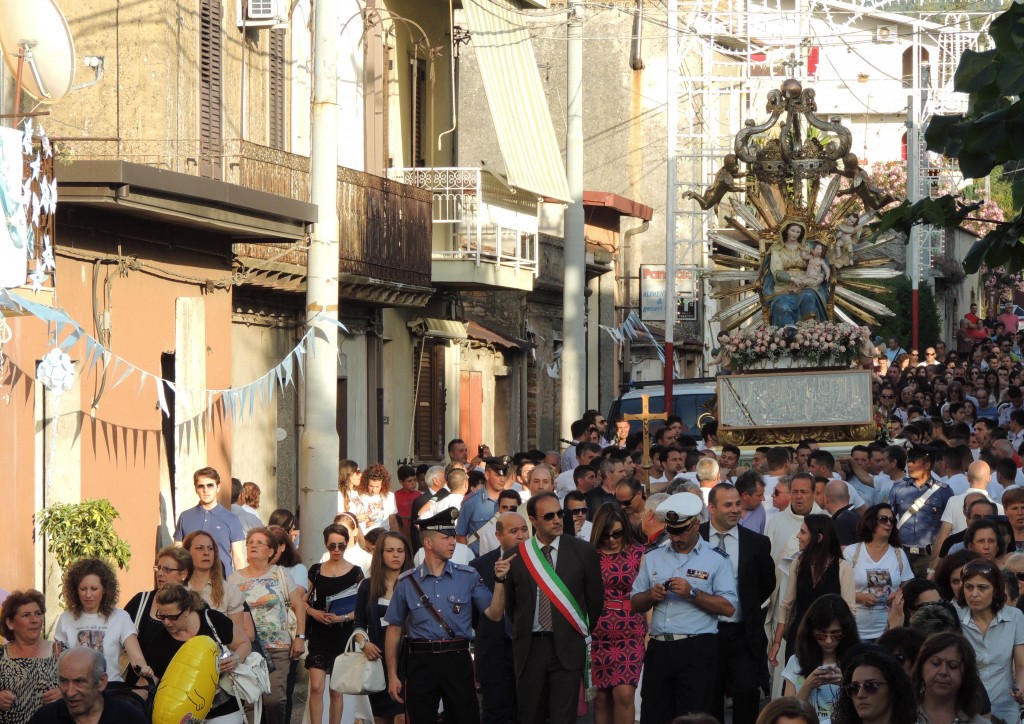
The mayor, with his tri-color sash and dark shades, and the local priest and altar boys and girls led the procession. Then, to the surprise of the carabinieri military police, the procession took an unexpected turn and headed towards the home of the Peppe Mazzagatti a known ‘Ndrangheta boss sentenced to life in prison for murders and Mafia activities and leading a ferocious blood feud between local families. The 82-year-old boss is now in a coma and spending his final days at home.
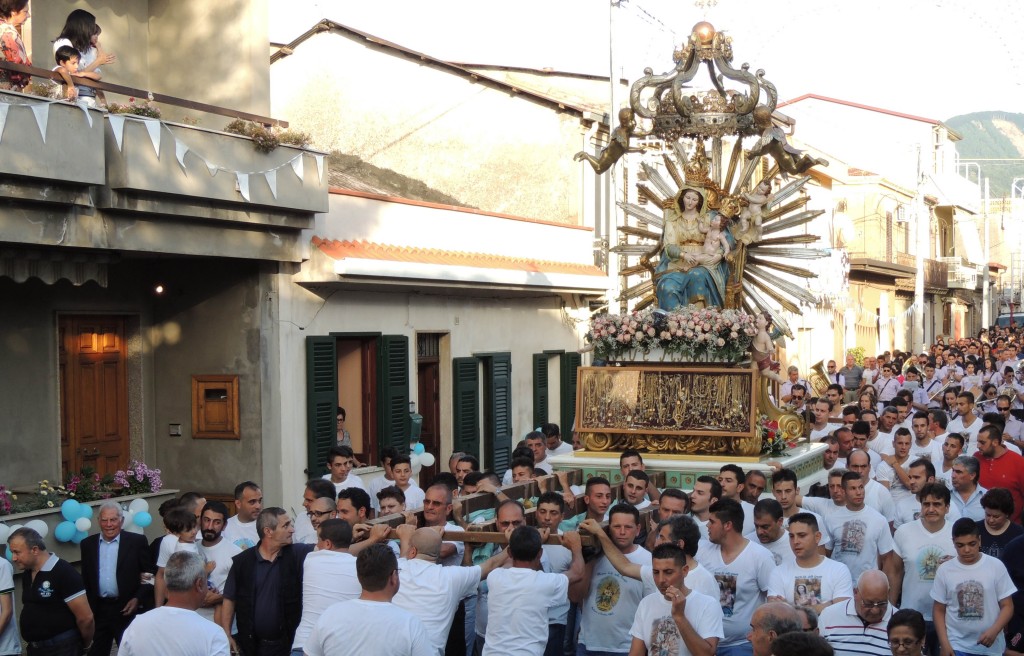
The procession turned the statue towards the boss’ home and made a brief bow (“inchino” in Italian) that reportedly lasted 30 seconds before returning to the designated route of the procession. The three Carabinieri police officers pulled out of the procession in protest. Mayor Domenico Giannetta was at the head of the procession and before leaving the Carabinieri police informed him of their decision.
In an interview with the Italian daily “La Repubblica” he said their decision shocked him, he denied that there was any “inchino” saying that the “the statue was turned by the bearers towards a side street where dozens of families live. I don’t think it was an homage to anyone in particular.” While that was the political reaction at the local level, at the national level, Italy’s Minister of Interior Angelino Alfano called the bow a “deplorable and revolting ritual.”
Anti-Mafia prosecutor Nicola Gratteri told my AP wire colleague Fran D’Emilio that the detour appeared to be a “challenge to the diktat” of Pope Francis.
The following Sunday, the local priest Don Benedetto Rustico, who happens to be the first cousin of the boss Mazzagatti, was presiding over Mass at Oppido Mamartine when he noticed a journalist at the back of the church. Don Rustico reportedly invited the congregation to get rid of the journalist encouraging them to “prendere a schiaffi e allontanare” him (rough translation: slap him around and get him out of here).
The second reaction to the Pope’s words came from the prison in the town of Larino north of Calabria in the Molise region where a couple hundred prisoners boycotted mass saying that since they have been “excommunicated” what was the point of attending Mass.
All this has led to a lot of people trying to figure what the pope meant by excommunication. There has been hemming and hawing by Vatican correspondents, Catholic bloggers, priests, and canon law experts and no clear answer has emerged. The press office at the Vatican has preferred to stay out of the debate letting the Pope’s words stand alone and refusing to comment on either the “inchino” at the procession or the boycott in the prison.
I turned to Father John Wauck a professor of communications at the Pontifical University of the Holy Cross in Rome for clarification. I wanted to know whether we should consider the mob boss to whom the procession did the bow “excommunicated” and whether the lower level mafiosi in the Larino prison would be considered excommunicated. The simple answer was it is not clear if anyone them would be excommunicated.
Father Wauck explained to me that indeed there are entire categories of people who can be excommunicated. For example the Schismatic group, the Lefebvrians, or anyone involved in an abortion: the woman who gets it, the doctor who carries it out or the boyfriend who pays for it. Other general causes for excommunication can be ordaining a woman, or desecrating the Eucharist. Father Wauck explained that excommunication is given for something considered above and beyond the seriousness of the sin, it must be a crime against the society of the church. Father Wauck said there are all sorts of heinous crimes that do not result in excommunication, infanticide, rape, and murder etc. For example, murder is a mortal sin, but not cause for excommunication. If a sinner repents and confesses, he can be cleared of his sins. Excommunication can also be lifted.
So if it is not clear who is being excommunicated, why were the lower level Mobsters boycotting mass? According to author Roberto Saviano, now living under police protection after publishing a book called “Gomorrah, Italy’s Other Mafia,” “When you are dealing with organized Mafia every action, every word, every gesture cannot be interpreted by its most obvious and elementary significance. It has to be inserted in the complex symbolic grammar of the communications of the clan.” So for Saviano the boycott was something else, it was “a declaration of obedience to the ‘Ndrangheta, a confirmation of the oath of fidelity…This boycott was a gesture to send a message to their very same organization. ”
The incidents have raised the question about the common use in parts of Italy of Mafia bosses participating as godfathers at baptisms and communions and participating in other church sacraments. The Secretary General of the Italian Bishops conference Monsignor Nunzio Galantino speaking to an Italian newspaper explained it this way, “The excommunication is public and who has publicly committed evil acts as a part of their lives, often making it a point of honor, must publicly declare their repentance and carry out concrete acts of reparation.”
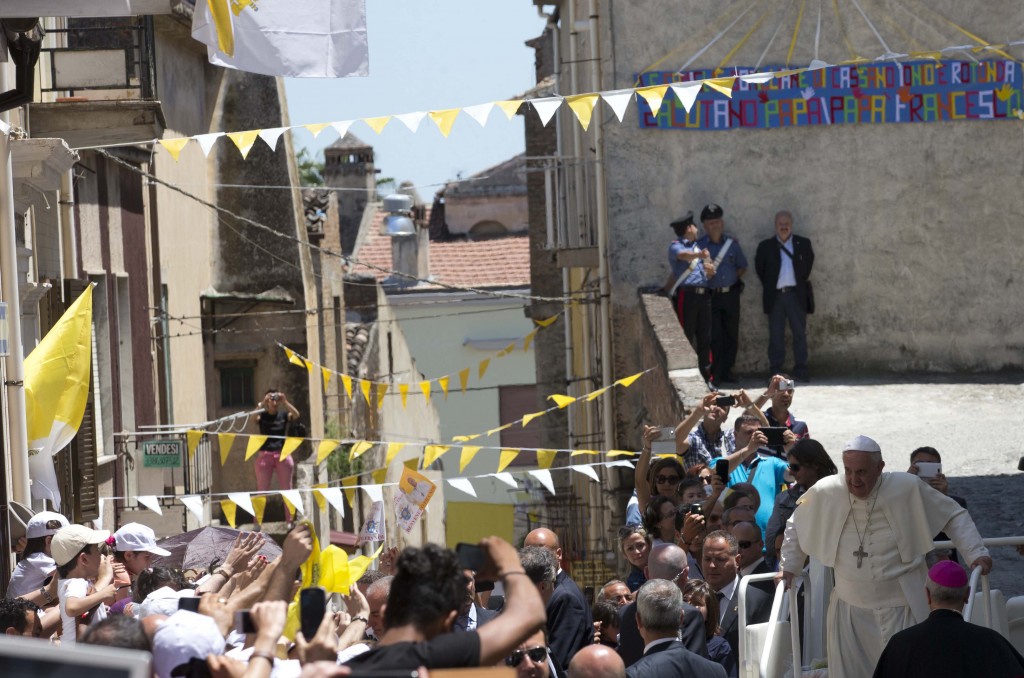
I tried to get a comment from the Vatican about all of this going through Father Thomas Rosica, who helps English language reporters covering the Vatican. This was his response, “The Pope condemned evil perpetrated by the Mafia. He has every right to say what he did…. evil is evil and the Pope is the Pope and he can say what he may wish. The Vatican has no comment about the public acts of defiance and insult on the part of Mafia leaders toward the Pope’s words. Such acts and insult speak for themselves.”
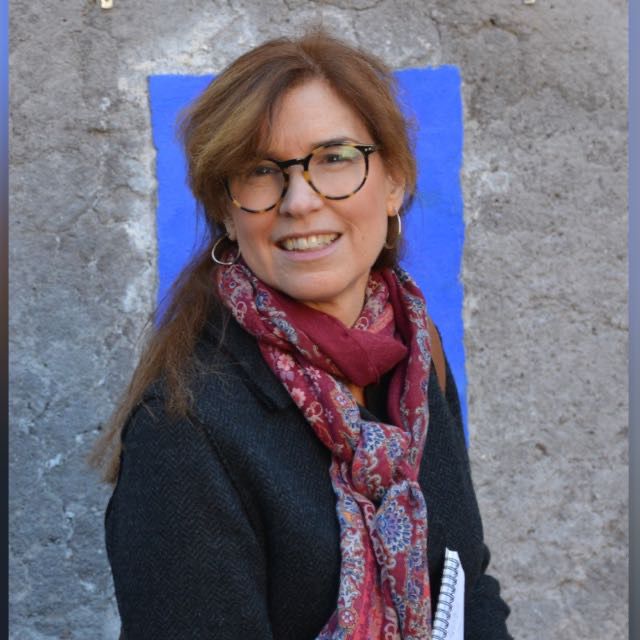
I find it interesting that one won’t be excommunicated for murder, but will be for abortion. After all, I thought the church considered abortion murder. This is just one of the ideas of the Catholic religion, which is my religion, that I find impossible to understand.
I agree with you Joan. I was not aware of that difference and I was pretty blown away when I found out.
This story gives me the shivers. A stunning show that the Pope has no real authority, and that the power they honor lies with the Mafia. But to use a holy statue of the Madonna to show that honor is grotesque. Mary, after all, sang that she bore her son for the God who pulls the mighty from their thrones and scatters the proud in the imaginations of the hearts . . .
There is so much openly flagrant disrespect for the law and for fundamental values now, in finance, in politics, in religion. And I of course, am appalled that ordaining a woman or helping her get an abortion can get you excommunicated but murder, rape and incest will not.
I hope the Pope has good bodyguards, because he needs them.
Thanks for the beautiful picture of him at the top, what a joyous smile!
It really does give one the shivers. Several Italian papers are reporting that it happened again on Tuesday in another Calabrian town called San Procopio. This time the procession stopped in front of the home of the boss Nicola Alvaro, another older boss serving out his time at home. Apparently his wife stepped out of their home and handed an “obolo” (offering) to one of the altar boys taking part in the procession. But I think perhaps in my post I was not clear about one thing. The Carabinieri military police pulled out of the procession in protest, Italy’s Interior Minister denounced the “inchino” but the Mafia bosses are not just operating in small towns in Calabria, they run a global network and have a lot of support in high places. I touched on this briefly in my blog post “sparkling Italians” when I mentioned a couple members of the Italian parliament who have now been convicted of Mafia association. There has been a long tradition in Italian politics of accepting Mafia support in exchange for votes leaving politicians in the hands of the Mafia. As far as the Catholic Church’s canonical laws regarding excommunication are concerned, it was a shock to me to learn this week of these blaring inconsistencies. Perhaps Pope Francis will eventually consider some canon law reform (once he gets through with the Vatican bank reforms).
Bravo Papa Francesco!
Definitely a courageous man.
I don’t think I will ever, ever understand this.
Thank you for explaining as well as you do.
D
I don’t think I will ever, ever understand this.
Thank you for explaining as well as you do, nonetheless.
D
Thank you Dana — understanding Mafia behavior is confusing and understanding the Catholic church policy on excommunication in equally so.
I’m surprised that no one has thought of the fact that the Pope is Argentinian and things can get mixed up in translation. I am fluent in Spanish from birth and not to say that the Mafia families understood wrong but there is another meaning to what he said. In Spanish, this could also translate as those that are not in communion with God are without communication with him. So, this means they have chosen to be away from God by proof of their actions. They need to get close to God and communicate with him more to understand what he really approves and expects of us and then not go against his teachings. I guess we will only know once we get it straight from the Pope as to what he really mean to say. Either way, I applaud his courage.
Thank you for that Andreana. I do not understand Spanish, and although the Pope was speaking in Italian sometimes I think he just says it the way he might in Spanish even though it has a slightly different meaning. I have heard Vatican radio colleagues saying this some times. Anyway, I appreciate your clarification. Of course, once I’ve put it in English, I’ve probably made more of a muddle of it all. Whatever he meant though, none of us doubt his courage.